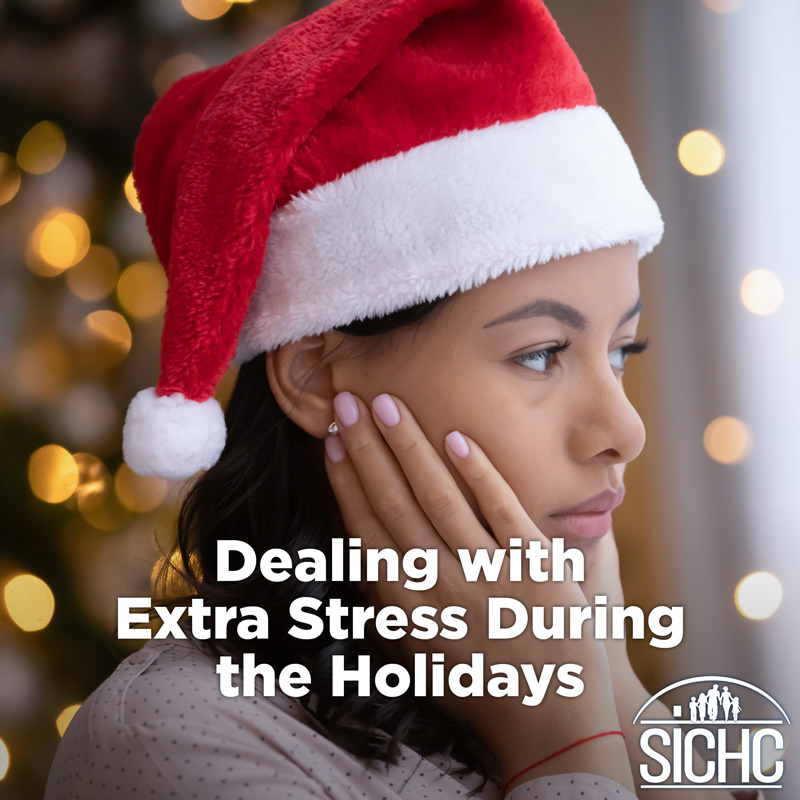Dealing with Extra Stress During the Holidays

By Teresa Faulkner, LCSW
Beautiful fall foliage. Great memories of grandmother’s special pies and cakes. Christmas music favorites on the radio.
And rising stress levels. Across the board.
Even before the major stresses brought on by the COVID-19 hot mess, to one degree or another, each holiday season traditionally brought unwelcome guests: stress, anxiety and depression. A recent national survey conducted by the American Psychological Association (APA) revealed many causes of stress associated with the pre-COVID-19 holidays – ranging from “extreme stress” to joy-sapping depression.
Perhaps you can relate, especially when holiday gatherings can become more complicated from possible family COVID-related safety issues. In addition to the major stressors of “lack of time” (69%), “lack of money” (69%) or “pressure to give or get gifts” (51%), the APA found that people get stressed out over family drama, broken relationships, travel issues, children issues and more.
Family holiday gatherings also underscore the feelings of loss and outright grief when a family member or close family friend has died since the last time the family gathered. In a COVID-19 age, these feelings may be magnified.
Like a family turkey, many people unfortunately “stuff” their feelings during the holidays. They “soldier up” and conceal what they may be experiencing, saying to themselves and others “I’m okay,” when in fact they’re not.
When feelings and stress are “stuffed,” or ignored, they often re-appear in our bodies in the form of poor sleep/insomnia, lack of energy/fatigue, headaches, stomachaches, bad moods/irritability and more. When we feel this way, sometimes we try to “self-medicate” by overeating or drinking more alcohol than usual.
This year it’s especially important to think about this. Earlier in October, three major national medical organizations banded together to declare a solemn national emergency of mental health issues. Hospitals, clinics, and doctor offices have seen alarming rises in children-related psychological and mental health issues. We’ve personally seen this alarming trend here at our Southern Indiana Community Health Care offices, especially with debilitating social anxiety among children.
Citing “soaring rates” of anxiety and other issues, the American Academy of Pediatrics, American Academy of Child and Adolescent Psychiatry, the Children’s Hospital Association called for immediate action, including better integration of behavioral health services into primary care services, particularly for children.
What can you do about all of this stress and emotional turmoil? Here are some suggestions:
- Acknowledge what you’re feeling. If you’re stressed because you can’t get what you want done in a timely manner, acknowledge it. If you’re stressed out because a close family member or friend passed away since you last gathered together, realize that it’s normal to feel sadness, even intense grief. When you experience major loss, don’t try to force yourself to try and “be happy.” Major feelings from major events like loss of life take time to process and heal.
- Set realistic expectations. For many people, preparing for and serving a significant meal for a lot of family members is just like performing on stage. You may want things to go absolutely perfect but setting those standards too high can bring on heightened anxiety. You don’t have to be perfect, or just like what your mother or grandmother used to prepare.
- Accept that this year will possibly be different. With COVID-19 issues still lurking around, many people may not feel comfortable in getting together in close quarters. Last year many families discovered the free 30-minute setting for a ZOOM call and brought extended families together online. If people decide not to come, try to let it go emotionally without allowing the drama-makers in your family having control of your emotions.
- Make time for yourself. Stopping and taking a moment to get grounded and re-centered is a great way to deal with mounting anxiety. Deep, deliberate, conscious breathing can help relax tense muscles. Some mindful meditation can also help re-center and keep you focused.
- If things get overwhelming, ask for help. Holiday stress can magnify other existing issues, especially if you’ve experienced recent loss. Children also are under all kinds of new stresses. Talking with a professional certified counselor or medical professional can provide useful ways to coping and deal with these issues.
This is called the “happiest time of the year” for a good reason. Deal positively with stress and make some great new memories!
A staff therapist at SICHC, Teresa Faulkner is a Licensed Clinical Social Worker (LCSW) and a Substance Abuse Professional. She is trained to work with trauma, grief, anxiety/panic attacks, depression, phobias and other behavioral health issues.
